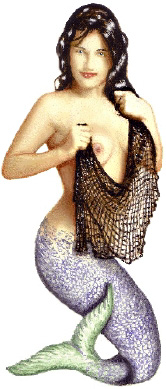...Best of Sicily presents... Best of Sicily Magazine. ... Dedicated to Sicilian art, culture, history, people, places and all things Sicilian. |
by Michele Parisi | |||
Magazine Index Best of Sicily Arts & Culture Fashion Food & Wine History & Society About Us Travel Faqs Contact Map of Sicily
|
The focus of the story is the experience of an aging professor of classics, once a senator, who the narrator meets and befriends. At a certain point in their acquaintance, the professor recounts his experiences with the mermaid (or siren) Lighea. Discreetly erotic, the tale reflects a sincere venture into the mythological-fantasy genre. Here we find perfect mythological and historical detail, but the message is never very clear. Is the professor's mermaid a metaphor? We cannot know. Perhaps the story is a meditation on life, mortality, eternity or man's collective memory. Or of the often ephemeral nature of romantic love. Each theme is revealed in the eloquent characterizations of the two men, who develop the relationship of a mentor and his student. One is struck by the vivid description of Lighea herself - implicitly contrasted to the fickle young lovers of the professor's aristocratic "student/apprentice." The description seems accurate. Even the mermaid's manner of eating is described vividly and, one would like to imagine, accurately. The story stands on its own, though it is perhaps better appreciated by readers of The Leopard. We may conclude that the author crafted something of himself into the complex personality of the unmarried Professor/Senator Rosario La Ciura. Perhaps most men will see something of themselves in his fantasy, in his search for the perfect woman. There are many ideas to be grasped in this short story - pregnant phrases framed within pensive passages. The two central characters of the story are quite cynical about Fascism, then in full flower, but also about a vaguely described "liberation" of Sicily, or at least the way the latter development unfolded. This probably reflects the author's own point of view, and certainly his personal experience. Like the narrator, Giuseppe di Lampedusa himself lost property through looting. (It was during the occupation of Palermo by General Patton's troops, when a temporary void in the rule of law facilitated general plundering.) The anti-Fascist undercurrent is too readily dismissed today, but it was taken more seriously when the story was first published in 1961. The critical remarks were powerful ones not entirely embraced among Italians less than twenty years following the defeat of Fascist military forces (in 1945), and there were still many recently-ex Fascists in Italian public life in the early 1960s - little changed psychologically from their wartime incarnations. The professor's strange death precisely mimics that of young Sicilian physicist Ettore Majorana in 1934, a coincidence no critic seems to have noted. Here, too, there seems to be a message. Professor La Ciura passes into the realm of memory; the author's spirit will live forever. The Leopard and David Gilmour's biography of its author can be ordered on the books page. About the Author: Michele Parisi, who presently resides in Rome, has written for various magazines and newspapers in Italy, France and the United Kingdom. | ||
Top of Page |

 The enigmatic
The enigmatic